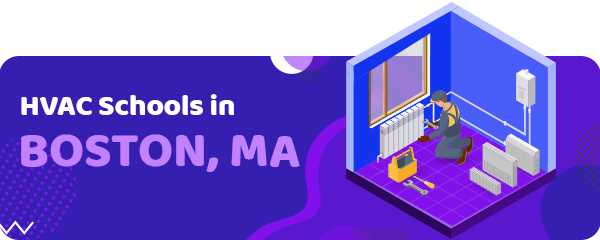When you’re looking to work in an HVAC career, it’s crucial that you find a training program that will get you ready to perform the required tasks to standards and that you are confident in your choice of career.
HVAC systems are used mostly for heating in Boston, and the cold winters take their toll on the systems that need maintenance done on a regular basis – driving the demand for more HVAC techs.
By attending one of the following schools, you can prepare for entry-level and advance in the field.
1 Benjamin Franklin Institute of Technology

About the School
This school has a Certificate in Heating, Ventilation, Air Conditioning, and Refrigeration.
They were accredited by the New England Commission of Higher Education in 2006.
There are day and evening programs offered and the total program is 800 hours in either the nine-month Fall session or eight-month Spring session.
They provide test preparation to get EPA certification that is required in order to be an HVAC & R technician today.
Courses Offered
The courses will teach you a variety of topics that are appropriate to this career field.
This includes how to solder and braze pipes along with their fittings, test pressure and detect leaks, and troubleshoot residential and commercial units, as well as the principles of refrigerants.
Address: 41 Berkeley Street Boston, MA
2 Massasoit Community College
About the School
At Massasoit Community College, you can enter either the 27-credit certificate or associate degree program for HVAC technology.
You’ll receive classroom instruction and also get hands-on experience in labs.
You can complete part of the degree program online.
The credit program will get you ready to work in entry-level positions including installation and service technicians.
Courses Offered
Courses will teach you about principles and applications of HVAC and refrigeration, basic electricity, system controls, and how to conduct service procedures.
It also will prepare you to take the EPA certification exam.
Just a few of the courses are Heat Principles and Application, Load Calculations and Duct Design, and HVAC Systems Control.
You would be expected to sign up for an Internship as part of your degree program.
Address: 1 Massasoit Blvd. Brockton, MA
3 Southeastern Technical Institute

About the School
This nine-month program for HVAC/R focuses on preparing students for employment in the field of environmental control.
Once you’re done with this accredited program, you’ll be ready to take the Massachusetts Oil Burners License Examination, as well as the EPA certification exam and a Safety certification exam.
It’s offered as an evening program four nights per week and starts every Spring semester.
Courses Offered
The courses will instruct you on ventilating and heating, the theory of air conditioning, electrical circuit particulars, and the installation, servicing, and troubleshooting of environmental control units.
They will prepare you for a variety of tasks that include the designing and contracting of systems and the consulting, inspecting and estimating process.
Address: 250 Foundry Street South Easton, MA
4 Porter and Chester Institute
About the School
The HVAC/R program at Porter and Chester Institute prepares you for a career as a technician providing environmental quality control in residential and commercial settings.
It’s a career-focused program that lasts less than 12 months.
The Brockton program is offered as a hybrid option with in-class and online instruction.
Courses Offered
You can earn the EPA certification and OSHA 30 certification as part of this program.
You’ll get field practice and your courses also will teach you how to install, maintain, and troubleshoot HVAC/R systems and units.
You’ll be prepared to do this work in residential, industrial, and commercial settings.
Address: 609 Belmont St Brockton, MA 02301
Schools Summary Table
| Rank | School | |
|---|---|---|
 |
#1 | Benjamin Franklin Institute of Technology |
| #2 | Massasoit Community College | |
 |
#3 | Southeastern Technical Institute |
| #4 | Porter and Chester Institute |
Read the full guide: How to Become an HVAC Technician
